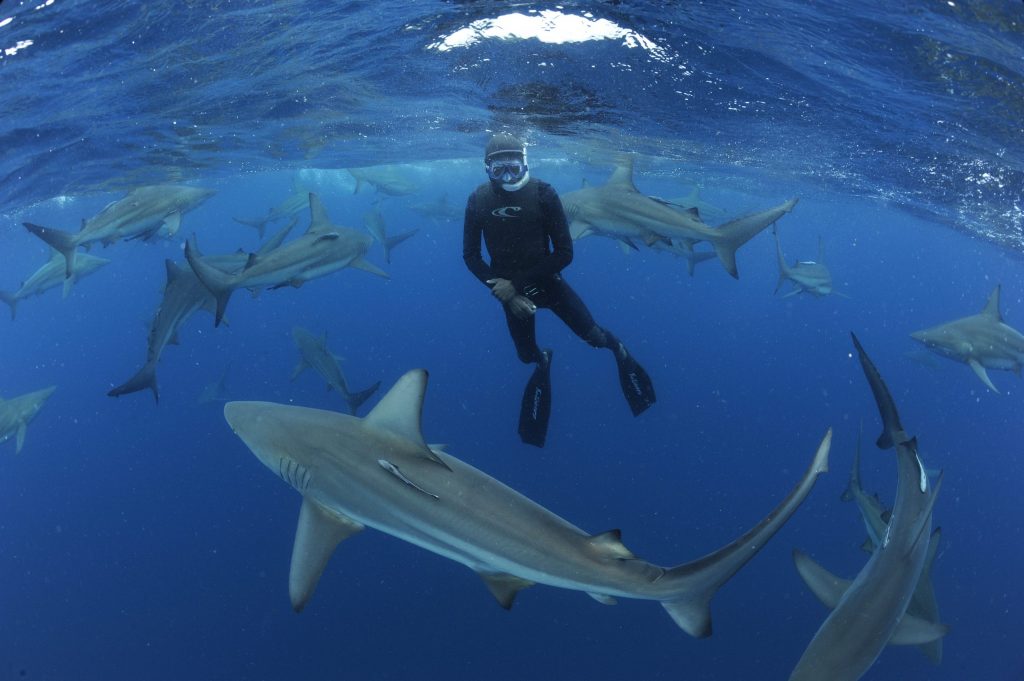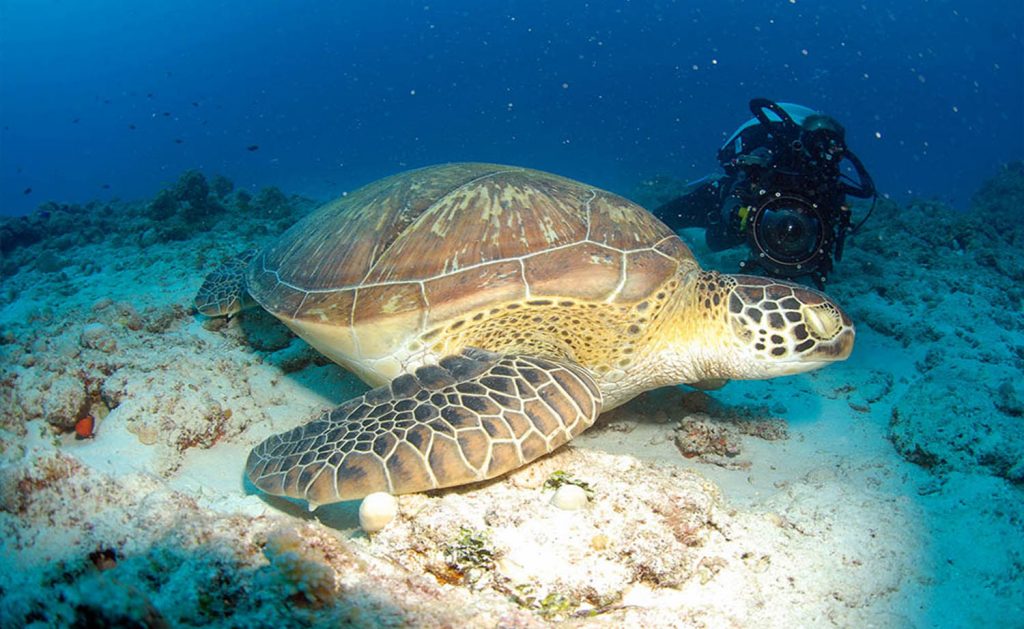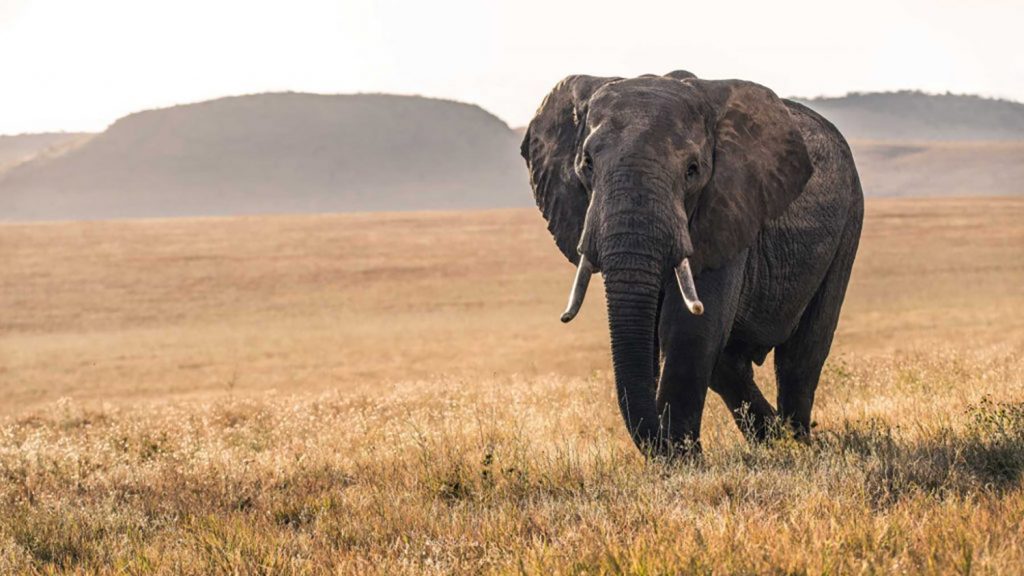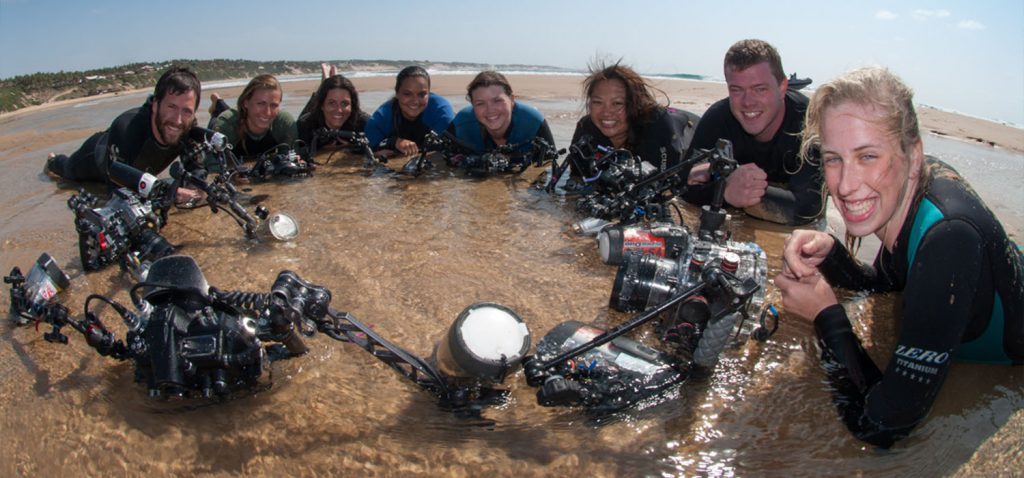Develop, film edit, and produce your own five minute wildlife film documentary in the heart of one of Southern Africa’s premium wildlife game reserves.
Whether you just have a desire to film Africa’s fascinating wildlife, or you are aiming for a career in the competitive world of wildlife film making, then this training program is for you. Our wildlife film making course is specifically designed to offer a practical introduction into the world of wildlife film making, and the work of camera operators, directors, producers, script-writers and the diverse positions required to produce and broadcast a successful wildlife documentary.
Come and make your own wildlife film making documentary, starting from concept and ending at TV screen, under the guidance and direction of passionate and experienced filmmakers. Revel in this unique environment and wildlife, and experience the highs, lows and challenges that wildlife film makers face daily when attempting to bring to life the wonders of nature. Walk away with a high quality five minute documentary showcasing your ability as a film maker.

What do I get out of the program?
The course is aimed at assisting in the development of aspiring wildlife filmmakers. Students on the course will spend a month designing, writing, filming and editing their own five-minute wildlife documentary based on the animals of one of Africa’s most beautiful and well-stocked game reserves. At the end of the course, students will present their film to students and staff of Africa Media and walk away with a showpiece that can be used to break into the demanding wildlife filmmaking industry.
What practical training to I receive?
Film techniques, camera operation, understanding wildlife, equipment maintenance, crew management, footage workflow, working with talent (including animals), video editing, voice-over/soundtrack, and pitching your film.
What theoretical training to I receive?
Course introduction, orientation, inspiration and story, what is selling today, film equipment, script writing, wildlife presenting, marketing you/your films, ethics in wildlife filmmaking, funding your films, the art of pitching.
What months does the course run?
We run most months from March to November, However, we need to receive a minimum of three students into a monthly program to be operational. When you connect with me, we will let you know which months we are running.
- 1 – 28 March
- 1 – 28 April
- 1- 28 May
- 1 – 28 June
- 1 – 28 July
- 1 – 28 August
- 1 – 28 September
- 1 – 28 October
- 1 – 28 November
What does the course fee include and exclude?
What does the course fee include?
Accommodation, 3 meals per day (light lunch), expert instruction, 9 days filming and living on game reserve, use of broadcast quality HD video cameras, use of professional audio gear, use of a professional drone, filming expeditions to Monkeyland and Birds of Eden, travel to/from George Airport or the bus depot, internet.
What does the course fee exclude?
Additional short courses, laundry service, tourism excursions, extra food and beverages, alcoholic beverages, international and domestic flights, and game ranger tips.
If you choose to arrive early (before the 1st) or depart late (after the 28th) then we will ask $30 USD/day to cover additional accommodation. Food is not included on additional days.
Can I cancel once my place is confirmed?
Due to the number of applications received and limited places, we unfortunately do not accept all applying students. Therefore, we do not welcome cancellations or date changes after the final confirmation has been completed. Please make sure that the dates you indicate in your application form suit your own schedule/budget before applying.
We request that a non-refundable $750 USD deposit is paid within 14 days of being accepted into the program as confirmation. The remaining fee must be paid in full 30 days prior to arrival in South Africa.
Am I eligible?
No special requirements or qualifications are required; however, a background in film or biology will be of assistance.
What is the schedule?
The course is divided into three components, namely: pre-production (6 days), production (9 days) and post-production (5 days). A sample syllabus is provided here as a guideline. However, please note that the actual schedule may vary based on several factors.
- During pre-production, students will learn the concepts of making wildlife documentaries and the basics in camera use and filming techniques.
- During production, students will stay on Schotia Reserve and spend the days collecting footage for your documentary.
- During post-production, students will edit footage using Adobe Premiere Pro to create a 5-minute documentary. Students will also learn about pitching and selling your ideas and films.
In general, the month will follow a schedule of 5 days on and 2 days off per week. Again, this may vary, particularly when students stay at Schotia Reserve.
How long is the course?
The course lasts 1 month beginning on the 1st (arrival day) and ending on the 28th (departure day) of each month. If you choose to arrive early (before the 1st) or depart late (after the 28th) then we will ask for additional fees for extra accommodation. Food is not included on additional days
Do I require a work / volunteer VISA?
No. You will not be employed by Africa Media nor paid. On this course, you are entitled to enter on a temporary visitor’s permit (e.g. tourism permit). Tourist visas are usually issued for three months/90 days upon entry to South Africa. However, we do recommend that you contact the South African Embassy or Consulate in your country and confirm this fact. If your application period is for a period longer than three months, or if you plan to travel in South Africa prior to or after the course for a period extending 90 days, you will have to apply for a volunteer VISA application through your home embassy.
do I need my own filming equipment?
All video equipment is supplied as part of the course. If you want to bring your own equipment, particularly if you are interested in shooting with DSLR cameras, you are more than welcome.
In terms of post-production, you must bring your own laptop to complete editing. This should have at least 8GB RAM and be pre-loaded with Adobe Premiere Pro.
What equipment will I have access to?
Video Cameras available:
- 8 x Panasonic HVX-200P series P2
- 2 x NEX100 Sony cameras
- 10 x GoPro cameras (effects camera)
- 2 x Phantom 4 drone
Audio Equipment available:
- 8 x RODE shotgun mics (camera or boom mounted)
- 2 x Sennheiser and sony lavallière radio mic systems
- 1 x Tascam digital audio recorder
- 1 x Rode DSLR mounted shotgun mic
- 1 x Soundproof audio recording suite
Accessories available:
- 8 x video camera tripods
- 8 x video ‘throw bags’
- 1 x video camera crane
- 3 x reflectors
- 1 x radio control ‘cub cam’ filming vehicle
- 1 x camera slider (tracking shots)
Computers: Please bring your own laptop loaded with Adobe Premiere Pro, as we use this extensively on the course.
Where will I be staying?
Your home for the month will be in the beautiful town of Mossel Bay, South Africa. (Africa Media address – 182 Aalwyn Way, Aalwyndal, Mossel Bay, 6520)
For 9 of these days you will be staying on Schotia Safaris Private Game Reserve, living in the wilderness and collecting content for your production.
What information do I need to make my travel arrangements?
If you are travelling by plane, please fly to George Airport, South Africa. We will pick you up and drop you off at George Airport.
If you are travelling by bus, there is a bus stop in Mossel Bay just a few minutes from the guest house. We will pick you up and drop you off.
What are the arrival and departure dates?
Pickups and drop offs will be organized by Africa Media for you on the 1st day of the month (for arrivals) and the 28th of the month (for departures).
The program begins with paperwork and orientation on the 1st of the month. There is no need to arrive prior to the 1st; however, arriving earlier in the day is preferable, as it gives you some time to settle in before the course begins.
You can schedule your departure for any time on the 28th.
Do I need travel / medical insurance?
es. When you are accepted into this program, you agree to our liability and copyright documents, as well an agreement that you are knowingly partaking in potentially dangerous activities. You will not be covered for accidents or illnesses, so please do organize your own medical and health insurances. You may apply for a normal travel insurance policy. Chances that you will be injured by a predator are very slim if you follow the safety guidelines and do not try anything foolish of which we would not approve. However, you will be filming wildlife which can result in accidents. It is important to be covered in case of an emergency or accident. Be sure to have insurance coverage for your entire stay in South Africa.
What do I need to bring?
If you are getting ready to pack, here is a rough packing list of items you should consider bringing.
Clothing
- Work clothes. Bring what you are comfortable in, but ensure that you have warm, strong work clothing of neutral colors, solid work shoes such as hiking boots or trainers, a good sun hat with a wide brim and a warm hat/beanie. Gloves can be helpful for early mornings. Bring a tracksuit or something similar to lounge around in during the evenings, which can get cold. Also, face buffs help keep off the cold in the evenings.
- Social clothes. Mossel Bay is a small town, so social clothing should reflect a casual, non-formal style.
- A swimming costume.
Video and electronic gear
- Minimum of 1TB storage hard drive.
- Laptop.
You are more than welcome to bring any personal videography or photographic equipment; however, this is totally optional.
Editing programs
- Adobe Premiere Pro
Miscellaneous
- Toiletries & strong sunscreen (There are also plenty of shops to purchase from.)
- Prescription medication
- Passport & photocopy of passport
- Bank cards (Inform your bank of your travels.)
- Spare cash (rands)
- Phone & cables
- Sunglasses
Our address – 182 Aalwyn Way, Aalwyndal, Mossel Bay, South Africa
do I need extra money?
We offer optional weekend trips/activities for all students and interns. These activities cover a wide range of interests, and costs vary. Cash is required for these bookings. You may bring rands with you, but there are also ATMs nearby. Please note you do not have to go on ANY of these extra trips. This is simply for your information should you wish to participate.
Do I need malaria medication?
No, we are far from malaria areas, and there are no strange African diseases which you could pick up (that is if you respect the same safety rules as anywhere else in the world).

DAY 1-5 (Estimated)
Orientation – arrival and welcome. A day spent ensuring all paperwork is completed, living arrangements established and a familiarity tour of the local town/area. Introduction to the program, instructors, and assessment of each participant’s skills and capabilities.
Camera Training – A day spent learning about broadcast standard cameras and other camera types. Included is practical training in camera operation and basic functions of camera. Data management is covered.
Practical – Explore working farm and film animals, including reading their behaviour and determining best approach to filming different subjects. Footage download and start in editing sequences.
Human talent – a day spent learning about working with human talent, conducting a varied number of interview styles, and mastering the use of audio in documentaries.
Monkeyland – Practical filming expedition to Monkeyland and Birds of Eden. Focus on filming sequences and collecting full array of shots to build compelling sequences. Master animal behaviour and assessing behaviour to gain shots of difficult subjects.
DAY 6-10 (Estimated)
Editing mastering – Day working through entire process of editing sequences and productions from footage obtained at Monkeyland and Birds of Eden.
Story development – Practical workshops on writing stories and developing protagonists and characters. Master writing treatments and pitches and present pitches to class for general critique. Packing for travel to game reserve.
Travel and Orientation -Finish packing personal items and travel to game reserve for beginning of filming expedition. Afternoon spent on orientation game drive and meeting of guides and staff at reserve.
Filming practical – Full day spent filming and producing your personal documentary throughout game reserve. Using broadcast camera, radio control vehicles, drones, effects cameras, sliders and other production equipment.
DAY 11-15 (Estimated)
Filming practical – Full day spent filming and producing your personal documentary throughout game reserve. Using broadcast camera, radio control vehicles, drones, effects cameras, sliders and other production equipment.
Travel – Morning recreation drive, packing of equipment, departure from game reserve, travel back to Mossel Bay, cleaning of equipment and checking in of filming equipment.
Data Management & Editing. Day spent organizing video footage and ensuring all content is fully backed up on separate drives. Afternoon begin editing production, focusing on building sequences and timelines.
DAY 15-20 (Estimated)
Editing – Editing of video production with a focus on building timelines, establishing narrative, writing narrative and ensuring the timeline creates a narrative and story of desire.
Editing – Finalizing rough draft of timeline, building soundscape including music. Recording narration and finalizing audio of onscreen characters.
Editing – Finalizing production areas including production soundscape (laying narration) and conducting colour correction on the timeline. Presenting rough draft to program instructor for one-on-one critique.
Exporting and pitching – Finalizing with final edits to the timeline and then exporting the final production. The afternoon is spent preparing a pitch for the evening pitch and presentation of a documentary to Africa Media.
.
Schotia Game Reserve
Schotia Safaris Private Game Reserve is one of South Africa’s most renowned private game reserves and is located adjacent to Addo National Park. Learn more about this jewel of the Eastern cape at the reserve’s website.
View website – click here
Monkeyland
Monkeyland is the world’s first free-roaming multi-specie primate sanctuary. Its mission is to educate and foster a greater understanding of our primate cousins and the threats and challenges they are facing.
View website – click here
Birds of Eden
Birds of Eden’s unique two-hectare dome (the world’s largest) spans over a gorge of indigenous forest. Currently, it is home to over 3,500 birds from over 220 species, with the main focus being African birds. Visits to Birds of Eden are usually self-guided, however, guided walks are offered on request.
View website – click here
Get Started
I founded this program to inspire and mentor a new generation of wildlife filmmakers. Connect with me to secure your place or learn more about the program.





